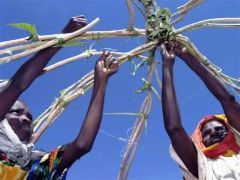Sudanese govt on the defensive over forced relocations
By Joyce Mulama
NAIROBI, Nov 10, 2004 (IPS) — Sudan’s government has vehemently denied claims by the United Nations that it is forcibly relocating internally displaced persons from camps in the strife torn western region of Darfur.

|
|
Unidentified displaced Sudanese women try to rebuild their tents in El-Geer refugee camp near Nyala in the Darfur area of Sudan on Saturday, Nov. 6, 2004. Inhabitants were later forced to move to another refugee camp. Sudanese Humanitarian Affairs Minister Ibrahim Hamid on Saturday called on the United Nations to work with the Sudanese government ‘to prevent the spread of sedition’ in Darfur where he claimed rebels are trying to stir up tribal unrest. ‘The rebels have not been put under any pressure or condemnation,’ he said. ‘Instead it has been the government which is being blamed even for trivial matters inside Nyala last week.’ Hamid was referring to the forced removal of thousands of displaced African villagers from the El-Geer refugee camp near Nyala, the capital of South Darfur state, to another camp. U.N. and African Union officials said the El-Geer camp was later destroyed.(AP). |
“It is the responsibility of a country to relocate its internally displaced persons. We have not violated any international law,” the country’s minister of humanitarian affairs, Ibrahim Mahmoud Hamid, told journalists at a press briefing held in the Kenyan capital of Nairobi, Tuesday.
“It is the right of our local authorities to deal with this issue and not the international community,” he added.
Hamid said that displaced persons had built informal homes at random in the town of Nyala, but that these had not been supplied with sanitation. As a result, government had decided to move the internal refugees to camps outside the town where proper sanitation could be provided.
“We are only transferring people to a better place. Is this a problem?” Hamid asked, adding “We have had 20 meetings with the UN discussing the establishment of new camps for the IDPs (internally displaced persons).”
“UN representatives here have seen the site and have agreed that the new site is better than the old one. They only want to be informed early enough of the relocation, and we have said this is a small problem which we will sort out,” he noted.
The press conference came after the UN’s envoy to Sudan, Jan Pronk, told the British Broadcasting Corporation that there was evidence of armed forces having forcibly relocated displaced persons from Nyala last week. More than 30,000 internal refugees were reportedly involved in the exercise – while women who were reluctant move are also said to have been threatened with rape.
The African Union (AU) has disputed claims that the relocation was forced, (the AU has deployed personnel in Darfur to monitor a ceasefire signed in April 2004 between government and rebel groups operating in the region).
“There is no forced relocation. There is nothing like that. The government is talking with the refugees, then relocating them peacefully,” Major General Okonkwo Festus, chairman of the AU Ceasefire Commission, told IPS in a telephone interview from El fasher, one of the three main cities in Darfur.
The region descended into a political and humanitarian crisis early last year after rebels from the Sudan Liberation Army (SLA) and the Justice and Equality Movement (JEM), took up arms against Khartoum to protest against the alleged marginalisation of Darfur.
Since then, government-backed Arab militias known as the Janjaweed (meaning “men on horseback”) have launched what humanitarian groups describe as a campaign of terror against ethnic groups suspected of giving support to the rebels.
The Janjaweed are reported to have torched houses, stolen cattle and destroyed crops belonging to the Fur, Masalit and Zaghawa tribes, which have long been in competition with nomadic Arabs over land resources.
The militias have also been accused of killings, abductions and raping women and girls in an apparent effort at ethnic cleansing.
UN statistics indicate that up to 70,000 lives have been lost in the violence, while more than 1.5 million people have fled their homes.
The United States’ senate majority leader, William Frist, has described the events in Darfur as genocide – this after visiting the area during August. His words echoed those of Secretary of State Colin Powell, who visited Darfur a month earlier.
A UN team was expected in Darfur Wednesday to investigate claims of genocide, ahead of a UN Security Council meeting where the situation in Darfur is expected to come under discussion. Talks are also underway between Khartoum, the SLA and the JEM in the Nigerian capital, Abuja.
During Tuesday’s press conference, Hamid criticised the Security Council for paying more attention to the situation in Darfur, than the long-running war between government and Christian and animist rebels in the south of the country.
“The Darfur issue is relatively new and all of a sudden the UN Security Council is involved. The other conflict, which has taken years, has not received such attention,” he remarked.
Peace talks to end Khartoum’s war with southern rebels led by the Sudan People’s Liberation Movement/Army (SPLM/A) have been underway for more than two years in Kenya. During that time, six protocols covering key political issues have been signed, and a final peace accord between the two groups has finally appeared within grasp.
The SPLM/A began its insurgency in 1983, in protest against domination by the northern Islamic government.
